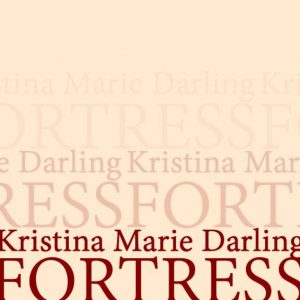78 pages, $14.00
Review by Carley Moore
Marriage, it turns out, is a kind of fortress. Or maybe marriage just calls us to homes—some of us will wind up in cabins, others apartments, and still others McMansions. Regardless of whether or not we can afford the down payment, the mortgage, or the rent, the ideology around marriage and housing runs deep in America. How else to explain why so many of us went belly up in 2008 so that we could have a chance at owning our little piece of the American dream? And why do we continue to get married when the divorce rate is well over thirty percent?
Kristina Marie Darling’s newest collection of poetry, Fortress, is a spare examination on the ruins of a marriage and the pain of that loss. The book’s shape calls to mind a box, square rather than the traditional rectangle, and aside from the preface and the epilogue which are erasures of Elaine Scarry’s classic work The Body in Pain—the poems inhabit the bottom of each page in the form of either footnotes or spare lines of prose. The remainder of the page is blank white space, a field onto which we can project our responses. The layout of these pages reminded me of the story templates my daughter’s first grade teacher gives her students; lines at the bottom and a vast white space for drawing. Part of this book’s beauty lies in Darling’s commitment to the white space, to the meadow, garden, and flowerboxes in which the speaker and her husband grow poppies, lilies, and geraniums. This landscape is contested, the meadow is burned, the poppies die, and the husband tears out primroses so that he can begin “tending the garden himself, with all of the grace of a landscape painter.” The book makes references to Persephone, romantic poets like Keats, and opium traffics in a dreamy-drug induced haze, and I couldn’t help but think of those early mythological marriages (Leda and Europa) in which the proposal is nothing more than a rape. The speaker seems just as baffled by her marriage, and she wanders the fortress of her house and its grounds picking up the objects from her trousseau as if on a hunt for clues as to who she was before she became a wife. In my favorite poem of the book, the speaker asks, “What is there left to say? When we married, I became his wife. I can no longer remember what I looked like before that veil descended, or the vow exchanged between us.” This poem, like many others in Darling’s book, suggests that the pain of a ruined marriage is a surprise and in some ways, like Scarry’s premise, beyond language.
The images of a burning country estate, an absent husband, and a locked rooms reminded me of the Gothic classic Jane Eyre, and when I finished the book I found myself thinking about how all brides must cross a threshold, some like the wise and self-knowing Jane survive the journey, but many don’t. Indeed, Darling asks, “What does it mean to cross a threshold? Most nights I know I would never choose to leave. I’ve tried but I can’t unpin that dead corsage from my perfect wrist.” The book offers us an opportunity to think of the ends of marriages not so much as failures (which is a relief), but as a final reckoning with objects—the wedding dress, the house, the corsage, the jewelry, and the photographs.
I read Fortress the night before I took my daughter to see the new version of Cinderella directed by Kenneth Branagh. We both went with some reluctance, more to fill the space of a rainy day than anything else. She is on to other princesses and deep into a Japanese animated film phase that delights us both, and yet we were transfixed. My feminist resistance to the tale got worn down as I examined my own deep ideology around the idea of a husband as a savior, and I was moved to tears by Helena Bonham Carter’s fairy godmother who enters the frame as a hag in search of a crust of bread and transforms herself back into a version of her first role as Lucy Honeychurch in A Room With a View—all lightness and stubborn good. Afterwards, my friend and fellow poet, Karen Weiser reminded me that the story is still so powerful because it’s about surviving abuse and trauma. She’s right, and still Cinderella stays with her wicked stepmother and sisters and endures that trauma so that she can inhabit the house of the parents she’s lost.
Darling’s Fortress is a descendant of fairy tales like Cinderella, and also a fracturing of it to get beyond the trauma of that original house that became a prison. Darling seems to understand that eventually, some of us pick the locks, we leave our fortresses, and we go.
***
Carley Moore is a poet, novelist, and essayist. Her work has appeared or is forthcoming in The American Poetry Review, Brainchild, The Brooklyn Rail, Fence, The Journal of Popular Culture, Mutha, Linebreak, and Public Books. She co-curates the reading series Dynaco Studio in Brooklyn and is currently working on a semi-
autobiographical novel called Gold Star. Twitter: carleymoore2 Website:
carleymoorewrites.com
![[PANK]](https://pankmagazine.com/wp-content/themes/pank/assets/images/pank-logo-large.png)

